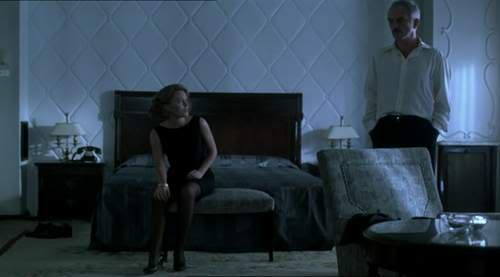
I never get tired of disagreeing
with that vacuous and obstinate conviction that a book adapted for
the screen always suffers in quality. I am told about excellent
novels that have been sacrificed or desecrated as they are turned
into vulgar films. Well, I always provide examples, far more
numerous, of good films based on mediocre or totally pathetic
novels. What happens is that usually the bad books, which gave rise
to good films, in all fairness, lapse into oblivion. Thus, for
instance, people continue to buy Nicholas Ray's Johnny Guitar,
which was based on a sappy western novel, and Hitchcock's Psycho
doesn't compare with the mediocre novelist who inspired that great
movie.
Lately, I have met readers of
Umberto Eco's books who were indignant about the screen version by
Jean Jacques Annaud, "The Name of the Rose." Well, in my opinion
Eco's book is a false novel, though very brilliant, whereas
Annaud's film is genuine cinema. Quite often, a film summarizes and
improves the book it is based on, perhaps for simple reasons of
economy. For example, "The Tin Drum" is an unbearably long novel,
which conceals in its core a lovely story. Volke Schlöndorff 's
film adaptation of "The Tin Drum" selects and reveals the purest
aspects and essence of that story and represents a considerable
improvement of the original work. There are also cases in which the
book and novel are equally good, but I don't know if it is by
chance that all the cases I recall have to do with John Huston:
"The Asphalt Jungle", "The Treasure of Sierra Madre" and, above
all, "Dubliners", a master piece, miraculous and absolute, that can
only be compared to the book written by James Joyce, on which it is
based. I can think of another case, which, though more modest, is
also a good example: the film Chabrol made based on a novel by
Simenon, "Les Fantômes du chapelier".
So I think that is enough; people should stop frowning virtuously
when a reference is made to the relationship between cinema and
literature: in filmmaking, like in writing books, the only thing
that really counts is talent, and the only difference is that, in
the case of literature, the talent involved is individual whereas
in films several brains determined to do a joint job are involved.
Novels belong to those who write them and films to those who make
them. If a novelist becomes enraged because a film adaptation of
his work isn't faithful to his book, all that can be said is that
he should have thought about that before selling the rights.
The movie director who adapts a
novel to the screen is just a reader who visually translates the
book he reads. Readers, like novelists and movie directors, can be
clumsy or bright and therefore films aren't faithful or unfaithful,
they are either good or bad, and that's it. Also, there are cases
in which happily, the novelist not only admires the film that has
been made from his book but also acknowledges it. That is precisely
what happened to me when I saw an unfinished copy of "Beltenebros"
(Prince of Shadows) directed by Pilar Miró.
In general, when I write I don't
usually picture the faces of my characters. When I saw another film
adaptation of one of my novels, I didn't recognize the
protagonists. However, when the lights went out in the screening
room where Pilar Miró sat silently near me and I saw Terence Stamp,
I knew that his was the face of Captain Darman, and that the really
weird things I wanted to write in my book, and which now seem so
distant to me, had been inexplicably transmuted into the images of
that film.
ANTONIO MUÑOZ MOLINA.